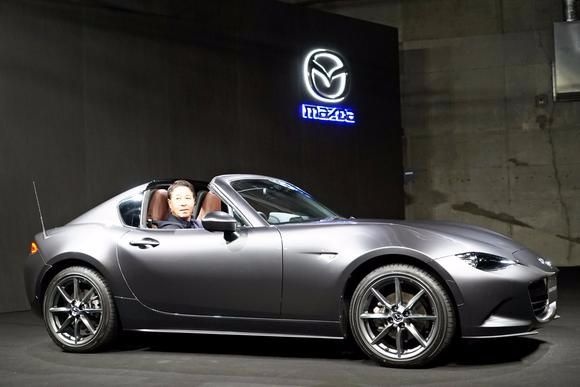
TOKYO -- Japan's Mazda Motor may be forced to rethink its North American strategy centering on Mexican production as U.S. President-elect Donald Trump hints at erecting a trade barrier to bring back manufacturing jobs to his country.
Tariff wall
On Thursday, Mazda showcased its Roadster RF convertible sport car with a metal roof in Tokyo. As soon as the briefing was finished, reporters showered President Masamichi Kogai with questions about the potential impact of a Trump presidency following the real estate mogul's victory in Tuesday's election.
But he does not seem to know the answer. "North America is an important market and we are not thinking to change [the strategy]," Kogai said. "We will formulate responses when concrete policies come to the fore."
Signs of a slowdown are emerging at Mazda. After four years of red ink following the 2008 Lehman shock, the company managed to pull off a recovery with offerings that combine its fuel economy technologies and bold styling. But its profit will probably shrink for the first time in five years in fiscal 2016, due mainly to erosion from the stiff yen.
Although Mazda's global sales are seen climbing to a record 1.55 million units in the year ending March, strengthening its earnings base was viewed as inevitable. Then came the Trump shock.
Japanese production once accounted for around 80% of Mazda's global output. But in 2014, the company opened a Mexican plant with an annual capacity of 250,000 units, to shield itself from currency swings and to cultivate the North American market.
The North American Free Trade Agreement was a key consideration in picking the location, because the company would be able to utilize cheaper Mexican labor and benefit from the tariff-free arrangement for exports to the U.S.
But Trump has called NAFTA the "worst trade deal" ever signed by the U.S., saying the arrangement has put the U.S. at a disadvantage. The U.S. will either renegotiate or withdraw from the trade pact, Trump has said. He went even further to suggest America may impose high tariffs on shipments from Mexico.
Mazda has no U.S. factories, so this could jeopardize the company's North American strategy.
What could Mazda do then? Kogai says the company plans to continue honing its technology and raising its brand value. But overcoming such a drastic market shift alone would not be easy.
One way is to get help from Toyota Motor, with which Mazda partnered last year, a consultant specializing in the auto industry said. Toyota has multiple major U.S. plants, so if Mazda can tap some of that capacity, tariff risks could be minimized.
Of course, Mazda is not alone. Major Japanese carmakers all operate Mexican plants and use them as the export base for the North American market.
The annual output capacity of Japanese automakers in Mexico could reach 2 million autos in the future, according to a forecast. Toyota and Honda Motor may decide to shift production to other parts of North America, but an unexpected shake-up in production bases would result in a heavy burden. Unnecessary cost increases could then wear out their competitive edge in the cash-cow market of North America.



